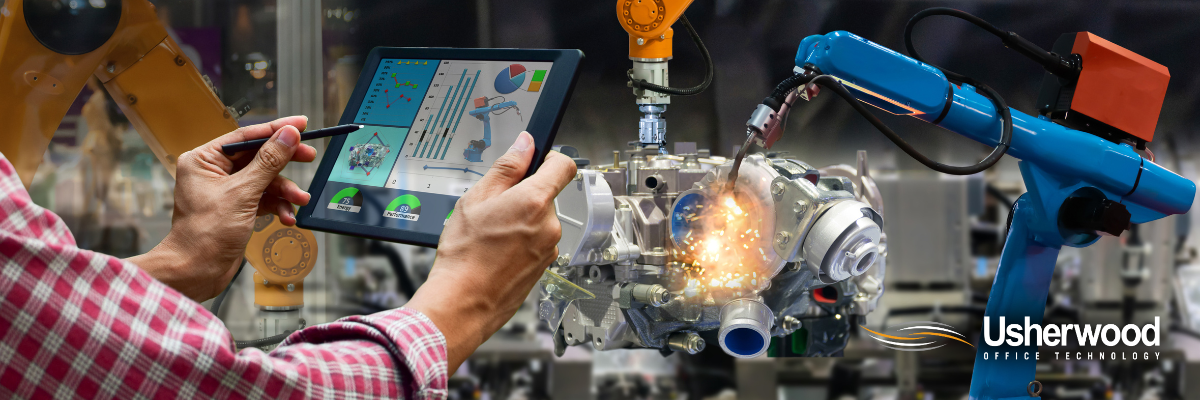By: Jada Sterling, Digital Content Manager on November 14th, 2024
How Do Outdated Manufacturing IT Tools Impact Production?
Manufacturing is a type of business that relies on efficiency to make money. If production slows down, you can get behind. Halts in production can lead to a direct or indirect loss of money, so a business owner's top priority is keeping things running smoothly.
You may wonder if updating your IT tools is worth the investment for your manufacturing business. We have many resources on the general costs of faulty IT infrastructure, but here's a look at how poor IT strategy can cost your manufacturing business in the long run.
The True Cost of Downtime in Manufacturing
There are countless things that can end up causing financial losses in manufacturing. Inefficient processes can waste time, money, materials, labor costs, and more. The typical causes of inefficiency in manufacturing are described in the acronym T.I.M. W.O.O.D. These stand for:
Transportation - Wasted efforts to move materials from one point to another that aren't actively being worked on. This can waste energy, labor hours, fuel, and more.
Inventory - Excess unused materials that are just taking up space and wasting money.
Motion - Wasted time and energy spent by employees moving around, bending, walking, lifting, etc. This could be due to poorly designed layouts or a lack of time-saving tools and technology.
Waiting - This is good ol' fashioned downtime caused by technology outages, replacements, or waiting for materials, approvals, or information in order to resume production.
Overproduction - This refers to excess inventory either in quantity or quality. Overproducing materials can waste time and resources creating, storing, and transporting goods unnecessarily.
Over-Processing - This refers to excessive steps added to processes that slow down production. This can include overreporting on irrelevant metrics, focusing on precision where it is not necessary, or including more functionalities that are needed or make sense for a product.
Defects - In short, this describes products that are not up to standards and are unusable to customers. Defects can cause losses in time, labor, materials, and money.
Why Do We Have to Replace Old Technologies with New Ones?
If you've experienced any of the productivity killers described by T.I.M. W.O.O.D., there are likely devices and tools to help mitigate these losses. The rise of smart machines has vastly improved productivity capabilities for manufacturing businesses that directly financially suffer from inefficiencies.
Older technology is more prone to downtime, due to outdated software, features, and worn-out elements. This means that older machines can slow down production and put you at greater risk of financial losses over time.
The argument for proactively replacing technology before it becomes unusable is similar to the concept of leasing a new car vs driving an older car with high mileage.
Your expenses with a new vehicle would be consistent and predictable, with minimal repair or maintenance costs associated. Conversely, an older car could unexpectedly saddle you with costly fixes from worn-down parts, and could easily become totaled from catastrophic malfunctions.
After all, it would be easier to budget for a consistent $300 payment per month for a brand-new lease than surprise $1000 fixes at random and often inconvenient times. The same goes for IT equipment such as computers, servers, and smart devices.
Cybersecurity and Manufacturing
Another reason for the popularity of IT services for manufacturing companies is the onslaught of cyber attacks targeting these businesses. Cyber attackers often target this sector since it is especially vulnerable to downtime in manufacturing processes.
Things like ransomware or denial of service attacks can shut down individual machines or your entire network if hackers can get past your protections. Read about current trends in manufacturing cybersecurity from one of our experts here: Ask the Expert: Navigating Cyber Threats to Manufacturing Industry
Through network monitoring services and thorough risk assessments, cybersecurity services can elevate your defenses against malicious cybercriminals. This way, you can safeguard your manufacturing operations and secure your data backups in case of attacks.
How Can Technology Improve Productivity in Manufacturing?
Manufacturing in today's world relies on digital devices. This is called the "Internet of Things" or IoT, because there are so many machines and devices that connect to your business network. Advanced IoT technology is used to:
- Automate processes
- Ensure efficient use of resources
- Enhance efficiency through tracking and analytics
- Monitor & manage inventory
- Manage & mitigate delays
- Identify & eliminate blind spots
The prevalence of advanced software and smart machines means manufacturing businesses can grow and scale faster than ever before.
With better tracking and project management capabilities, they're poised to increase profit margins and increase product quality in more efficient, environmentally friendly ways.
What is the Future of Manufacturing IT Solutions?
These advances in manufacturing technology come with new issues as well. The reliance on connected software and IT networking creates risks for production if something goes wrong. This has led many manufacturing companies to outsource IT support in order to save on costs and reduce downtime.
Managed IT services for manufacturing organizations can offer clear roadmaps for maintaining and optimizing advanced technologies for greater operational efficiency. The manufacturing sector relies on predictability and secure business processes, so the cybersecurity solutions offered by managed service providers (MSPs) is paramount to their success.
Leverage Manufacturing IT Support to Improve Productivity of Factory Workers
IT support for manufacturers can also enhance the experience of your employees. Easy-to-use technology with readily available IT support technicians can streamline fixes, minimizing downtime and frustration with technical difficulties.
Through qualified and diversified teams of IT professionals, manufacturers can have peace of mind that they are getting the most out of their smart technology. If you're ready to explore the possibilities of what IT services can do to enhance your manufacturing efficiency, click the button below to get in touch with an IT expert.
Read On

Massachusetts-Based Custom Manufacturer Levels Up IT & Cybersecurity
American Durafilm, a custom manufacturer based in Holliston, MA, needed to digitize customer...

Surprising Industries That Are Moving to Digital Signage
Digital signage is a useful tool for any industry, allowing business owners to display menus,...

Top Reasons Manufacturers Don't Outsource IT
The IT landscape is broadening every day, and with the advent of more advanced production...




